6 aug 2020
|
|
Israeli occupation forces and settlers today attacked Palestinians who were attempting to protect their lands near a water well in the village of Deir Sharif, west of the northern West Bank city of Nablus, according to Mohammed Azem, mayor of nearby Sebastia village. video
He said Palestinians from both villages went to the area where settlers had set up a tent and a caravan near the well, which is often a prelude for taking over the land to expand their illegal colonial settlements. He added that the occupation soldiers and settlers attacked the Palestinians and kicked them out of the area where the local villagers plan to hold the Friday prayer tomorrow in an effort to prevent the establishment of a new colonial outpost on their lands. |
|
|
Israeli occupation forces today destroyed irrigation ponds in al-Jiftlik village, located to the north of Jericho in the Jordan Valley, said a local municipal source. video
Mayor of al-Jiftlik, Ahmad Abu Ghanem, said the Israeli occupation destroyed three ponds that were used to irrigate 70 dunums of village land, filling them with debris to discontinue their use. Yesterday, Israeli forces uprooted and seized some 100 palm trees in the village. Israel has severely restricted Palestinian access to water in the area, particularly the 23 underground wells used for agriculture. Local water springs are susceptible to dryness and depletion as a result of Israel’s control over water. |
The Israeli water company, Mekorot, has depleted the wells and has been granted a monopoly on the drilling, restoration, distribution and selling of Palestinian water. In contrast, Palestinians have been forbidden from constructing new wells or restoring existing ones.
1 aug 2020
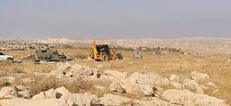
Israeli occupation forces obstructed today works for the construction of a water pipe in the village of Atouf, near the town of Tubas in the northeast of the occupied West Bank, according to local sources.
Mayor of the village, Abdullah Besharat, told WAFA that the Israeli occupation army ordered the driver of a bulldozer working on the site to briefly stop the works.
He added that the project aims at providing potable water to dozens of livestock and cattle breeders in Atouf and neighboring villages.
Mayor of the village, Abdullah Besharat, told WAFA that the Israeli occupation army ordered the driver of a bulldozer working on the site to briefly stop the works.
He added that the project aims at providing potable water to dozens of livestock and cattle breeders in Atouf and neighboring villages.
23 july 2020

Israeli forces delivered this morning military demolition and stop-construction orders against several structures in al-Walaja village, west of Bethlehem city, said a local source.
Ibrahim Awadallah, a local activist, said Israeli forces delivered military orders to stop the construction and demolish three houses in Jabal al-Rwisat area of the village, purportedly for being built without licenses.
The owners of the houses slated for demolition were given time to carry out the demolition by themselves or risk paying exorbitant demolition costs if done by the army.
Meanwhile, Israeli troops stormed Khallat Samak area in the village, where they handed military orders to stop the construction and demolish a water well and livestock barns.
Yesterday, similar orders were issued against a house under construction and four agricultural rooms in the same village.
Located west of Bethlehem, 97 percent of the area of al-Walaja village is isolated by a section of Israel’s apartheid wall. The majority of this land is agricultural land, forests and open spaces.
The village is flanked by two illegal Israeli colonial settlements - Gilo from the east and Har Gilo from the south.
Ibrahim Awadallah, a local activist, said Israeli forces delivered military orders to stop the construction and demolish three houses in Jabal al-Rwisat area of the village, purportedly for being built without licenses.
The owners of the houses slated for demolition were given time to carry out the demolition by themselves or risk paying exorbitant demolition costs if done by the army.
Meanwhile, Israeli troops stormed Khallat Samak area in the village, where they handed military orders to stop the construction and demolish a water well and livestock barns.
Yesterday, similar orders were issued against a house under construction and four agricultural rooms in the same village.
Located west of Bethlehem, 97 percent of the area of al-Walaja village is isolated by a section of Israel’s apartheid wall. The majority of this land is agricultural land, forests and open spaces.
The village is flanked by two illegal Israeli colonial settlements - Gilo from the east and Har Gilo from the south.
22 july 2020
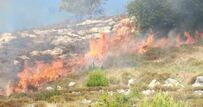
A horde of Israeli settlers on Tuesday afternoon torched large areas of Palestinian land in Madama village in the West Bank district of Nablus.
Eyewitnesses reported that the fire destroyed dozens of olive trees owned by Palestinian citizens in Madama and neighboring villages.
They said that Israeli occupation forces deliberately hindered the work of Palestinian civil defense crews who rushed to the scene to put out the fire and fired tear gas canisters at them.
Madama residents said that a few days ago, the same Israeli settler group, who come from Yitzhar Settlement, seized a water well in their village and set up a pump to steal water from it and transfer it to their houses.
Settler violations are almost a daily occurrence in the West Bank, and Madama village in Nablus is one of the hardest-hit areas.
Eyewitnesses reported that the fire destroyed dozens of olive trees owned by Palestinian citizens in Madama and neighboring villages.
They said that Israeli occupation forces deliberately hindered the work of Palestinian civil defense crews who rushed to the scene to put out the fire and fired tear gas canisters at them.
Madama residents said that a few days ago, the same Israeli settler group, who come from Yitzhar Settlement, seized a water well in their village and set up a pump to steal water from it and transfer it to their houses.
Settler violations are almost a daily occurrence in the West Bank, and Madama village in Nablus is one of the hardest-hit areas.
1 july 2020
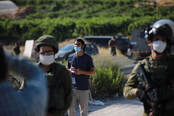
Israeli settlers today stole Palestinian water in the West Bank village of Madama, south of the northern West Bank city of Nablus, according to a local activist.
Settlers from the illegal Yitzhar settlement installed a water pump on a well used by the Madama village residents and pumped all the water out and took it away, said Ghassan Daghlas, who monitors settlers' activities in the north of the West Bank.
Settlers from the illegal Yitzhar settlement installed a water pump on a well used by the Madama village residents and pumped all the water out and took it away, said Ghassan Daghlas, who monitors settlers' activities in the north of the West Bank.
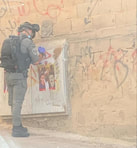
Israeli soldiers demolished, Wednesday, a Palestinian home and a barn for horses, in the eastern part of the southern area of the al-‘Isawiya town, in occupied Jerusalem, in addition to destroying water pipelines.
Mohammad Abu al-Hummus, a member of the Follow-Up Committee in al-‘Isawiya, said the soldiers demolished a home, owned by a member of Abu Teir family, consisting of two rooms, bathrooms, and a kitchen, in addition to the barn.
Abu al-Hummus added that the soldiers also destroyed water pipelines and agricultural installations.
He stated that the demolitions in that area are part of Israel’s continued construction of the so-called “National Garden,” which already led to the illegal annexation of vast areas of Palestinian lands and the demolition of Palestinian property.
Wednesday’s demolitions took place in the only remaining area where the Palestinians can build or expand the existing homes and structures.
Abu al-Hummus said the demolitions in al-‘Isawiya area part of a series of Israeli violations against the Palestinians and their properties in the town, and added that these assaults have escalated since last year, and included daily violent home invasions and abductions of the residents, demolitions and demolition orders, in addition to attacking students in their schools, or while heading there or going back home.
Also Wednesday, the soldiers demolished a home in Deir al-Sunna neighborhood, in Jabal al-Mokabber, southeast of occupied East Jerusalem. video
On Tuesday, dozens of soldiers invaded the town, and started removing graffiti and photos of Mohammad Obeid, 27, who was killed by the army on June 27, 2019. video video
Mohammad Abu al-Hummus, a member of the Follow-Up Committee in al-‘Isawiya, said the soldiers demolished a home, owned by a member of Abu Teir family, consisting of two rooms, bathrooms, and a kitchen, in addition to the barn.
Abu al-Hummus added that the soldiers also destroyed water pipelines and agricultural installations.
He stated that the demolitions in that area are part of Israel’s continued construction of the so-called “National Garden,” which already led to the illegal annexation of vast areas of Palestinian lands and the demolition of Palestinian property.
Wednesday’s demolitions took place in the only remaining area where the Palestinians can build or expand the existing homes and structures.
Abu al-Hummus said the demolitions in al-‘Isawiya area part of a series of Israeli violations against the Palestinians and their properties in the town, and added that these assaults have escalated since last year, and included daily violent home invasions and abductions of the residents, demolitions and demolition orders, in addition to attacking students in their schools, or while heading there or going back home.
Also Wednesday, the soldiers demolished a home in Deir al-Sunna neighborhood, in Jabal al-Mokabber, southeast of occupied East Jerusalem. video
On Tuesday, dozens of soldiers invaded the town, and started removing graffiti and photos of Mohammad Obeid, 27, who was killed by the army on June 27, 2019. video video
21 june 2020
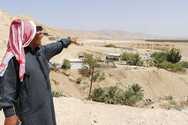
Israeli occupation forces ordered today a halt on the construction of residential and agricultural structures in the occupied West Bank districts of Hebron and Salfit, according to local sources.
Rateb Jabour, coordinator of the popular committees against Israeli settlements in Hebron, told WAFA that an Israeli military force raided the village of Birayn, near the town of Yatta, and ordered to Palestinians to stop the construction of their two homes, under the pretext that they were being built without an Israeli permit.
Meanwhile, Israeli troops ordered a Palestinian citizen in the village of Bruqin, near the town of Salfit in the West Bank, to stop the construction of an agricultural facility and a water well, also under the same pretext.
The villages where the constructions were ordered to stop are located in areas classified as Area C, the 60 percent of the occupied West Bank under full Israeli administrative and military control, where Israel rarely issues construction permits to Palestinians, forcing many people to build without permits.
Israel refuses to allow Palestinian development of any kind in Area C, which makes up over 60 percent of the total area of the occupied West Bank, and often demolishes what Palestinians build despite the Israeli ban.
Rateb Jabour, coordinator of the popular committees against Israeli settlements in Hebron, told WAFA that an Israeli military force raided the village of Birayn, near the town of Yatta, and ordered to Palestinians to stop the construction of their two homes, under the pretext that they were being built without an Israeli permit.
Meanwhile, Israeli troops ordered a Palestinian citizen in the village of Bruqin, near the town of Salfit in the West Bank, to stop the construction of an agricultural facility and a water well, also under the same pretext.
The villages where the constructions were ordered to stop are located in areas classified as Area C, the 60 percent of the occupied West Bank under full Israeli administrative and military control, where Israel rarely issues construction permits to Palestinians, forcing many people to build without permits.
Israel refuses to allow Palestinian development of any kind in Area C, which makes up over 60 percent of the total area of the occupied West Bank, and often demolishes what Palestinians build despite the Israeli ban.
12 june 2020

Israeli armored tanks last night destroyed a water pipe serving Palestinian communities in the northern Jordan Valley region, northeast of the occupied West Bank, according to local sources.
Derar Sawafta, member of the local council of Bardala village, in the northern Jordan Valley, told WAFA that a 200-meter-long water pipe was destroyed as the Israeli armored vehicles ran over it during a military exercise, which involved the use of gunfire, in the area.
In the meantime, dozens of armored vehicles deployed for the first time at the outskirts of the villages of Tayasir and al-Aqaba, east of Tubas town.
Palestinian residents of the Jordan Valley regularly face evictions due to Israeli military exercises on or near their land. Only last month, Israeli forces evicted the village’s population three times for the same purpose.
The majority of the Jordan Valley is under full Israeli military control, and at least 44 percent of the total land in the Jordan Valley has been appropriated by Israeli forces for military exercises.
Derar Sawafta, member of the local council of Bardala village, in the northern Jordan Valley, told WAFA that a 200-meter-long water pipe was destroyed as the Israeli armored vehicles ran over it during a military exercise, which involved the use of gunfire, in the area.
In the meantime, dozens of armored vehicles deployed for the first time at the outskirts of the villages of Tayasir and al-Aqaba, east of Tubas town.
Palestinian residents of the Jordan Valley regularly face evictions due to Israeli military exercises on or near their land. Only last month, Israeli forces evicted the village’s population three times for the same purpose.
The majority of the Jordan Valley is under full Israeli military control, and at least 44 percent of the total land in the Jordan Valley has been appropriated by Israeli forces for military exercises.
1 june 2020
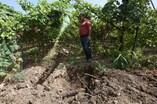
Israeli forces today seized bulldozers, a water tank and a water irrigation system in al-Jiftlik village in the occupied Jordan Valley and declared the area a closed military zone, according to Palestinian activists and security sources.
The sources told WAFA that Israeli soldiers set up a checkpoint in al-Jiftlik and prevented people from accessing the nearby city of Jericho, while telling people that al-Jiftlik is a closed military zone until 6:00 P.M.
They also said that the soldiers broke into and ransacked several homes in the village and detailed five people, including a man and his two sons.
Meanwhile, soldiers dismantled and seized an irrigation system that was providing water to over 40 dunums of land planted with grape vines and palm trees, two bulldozers, a tractor and a water tank belonging to Palestinian citizens and families, according to Aref Daraghmeh, a local activist.
The sources told WAFA that Israeli soldiers set up a checkpoint in al-Jiftlik and prevented people from accessing the nearby city of Jericho, while telling people that al-Jiftlik is a closed military zone until 6:00 P.M.
They also said that the soldiers broke into and ransacked several homes in the village and detailed five people, including a man and his two sons.
Meanwhile, soldiers dismantled and seized an irrigation system that was providing water to over 40 dunums of land planted with grape vines and palm trees, two bulldozers, a tractor and a water tank belonging to Palestinian citizens and families, according to Aref Daraghmeh, a local activist.
